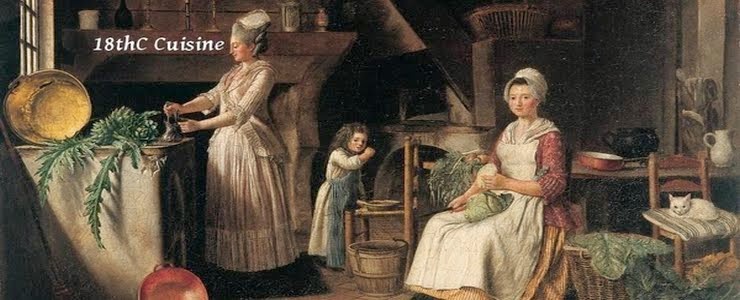The
Oil is a very considerable
Potage, which may be serv'd up as well on Days of Abstinence, as on Flesh-days.
An Oil for Flesh-daysTake all sorts of good Meats,
viz. Part of a Buttock of Beek, a Fillet of Veal, a piece of a Leg of Mutton, Ducks, Partridges, Pigeons, Chickens, Quails, a piece of raw Gammon, Sausages and Cervelas, all roasted or fried brown: Let them be put into a Pot, every Thing according to the time that is requisite for boiling it, and let a thickening Liquor be made of the brown Sauce to be mingled together. As soon as the scum is taken off, season your Meats, with Pepper, Salt, Cloves, Nutmeg, Coriander-seed and Ginger, all well pounded, with Thyme and sweet Basil, and wrapt up in a Linnen-cloth. Afterwards add all sorts of Roots and Herbs well scalded, accordingly as you shall think fit, such as Carrets, Turneps, Parsnips, Cabbage, Parsly-roots, Onions, Leeks and other Herbs in Bunches. In the mean while, you are to provide
Cuvets, Silver-pots and other Vessels proper for that purpose, and when your Potage is sufficiently boil'd, let some Crusts be broken into pieces, and laid a soaking in the same Broth, after it has been clear'd from the Fat, and well season'd. Before it is serv'd up, pour in a great deal of Borth, still continuing to take away the Fat; dress your Fowls and other Meats, and garnish them with the Roots, if you have only one great Dish: Otherwise they may be serv'd up without Roots; putting the
Cuvets on a Silver-dish, with a Silver-ladle in it, with which every one of the Guests may take out some Soop, when the
Oil is set on the Table.
An Oil for Fish-daysTake some good Broth, Peas-soop, or half Fish-broth; let all the above-mentioned Roots be put into it, and boil'd as much as is requisite: Then dress your
Oil, with a
Profitrolle-loaf in the middle, and garnish it with Roots.
* * * * *The court & country cook, faithfully translated out of French into English by J. K. A. J. Churchill, London, 1702, p. 166-167.
